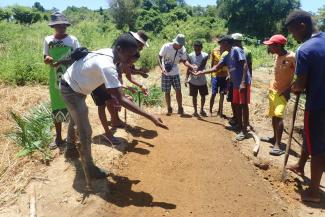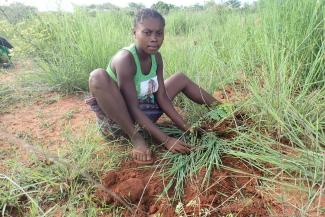The dry forests of the Menabe region in western Madagascar are world-renowned for the diversity of their plant and animal species, including many found nowhere else on earth.
In recent years these forests have faced some devastating threats. The forests were officially protected in 2007, but local populations continued to swell as migrants, driven by environmental degradation, poverty, and drought in the south of Madagascar, moved into the area. In addition to the expanding human demands upon the land, commercial interests exploited the situation to clear and burn large sections of the dry forests, primarily to grow corn and peanuts. Today, almost half of Menabe’s original dry forests have been destroyed.
While an exploding population is partly responsible for the destruction, the key to conserving and restoring these forests also resides in the local communities. The youth of Menabe are keenly aware of the plight facing their local environment, and they are deeply motivated to do something about it.
In March 2018, a group of local youth founded an association called Fo Sarotiny amin’ny Ala. The name means ‘We Treasure our Forests’ and the acronym FOSA honors Madagascar’s largest predator, the fosa, a cat-like animal that lives primarily within the Menabe dry forest.
FOSA brings together approximately one hundred youth volunteers, a nearly even split of male and female volunteers, from villages surrounding the Menabe Antimena Protected Area. Their primary focus is on reforestation, which they do by collecting seeds and establishing forest nurseries.
The group’s members have demonstrated their dedication to the cause. Alfred, a FOSA Vice-President says the group is extremely motivated and dedicated to the cause because, “if we do not take responsibility now, these precious gems of our region will disappear forever.”
USAID Mikajy has been partnering with FOSA and, along with additional support from Kew Madagascar Conservation Center (KMCC) and the local group Vohary, is helping to restore dry forests surrounding the Menabe Antimena Protected Area.
To date, a coalition of eight communities, including 400 households plus members of FOSA, have planted 5,986 seedlings over approximately 10 hectares. They have also established village nurseries and received training in agroforestry and reforestation techniques so that future reforestation efforts can be self-sustaining.


